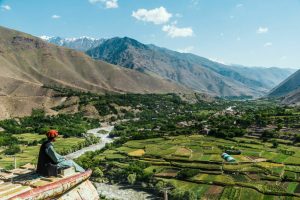Afghanistan is a land that, according to Allāmah Iqbal Lahore, is the heart of Asia, and its changes have a fundamental impact on the fate of the Asian people. For various political, economic and strategic reasons, this land has always been coveted and invaded by the world super powers. But finally, after suffering heavy casualties, they ended their occupation with humiliation.
Trained and educated Afghans in the Soviet Union formed some parties in Afghanistan, paving the way for revolutions, coups, implementation of the Soviet policies, and the Red Army’s invasion of Afghanistan. Afghanistan’s traditional and religious society did not surrender to the Russians and they ousted them after ten years. After the withdrawal of the Russians, the leaders of the Afghan Mūjāhideen groups could not agree and sit together, unfortunately. After a while, due to their lack of foresight, a civil war broke out and the fruits of several years of jihad were about to disappear and the enemies of Islam and Afghanistan took advantage of the situation.
In the midst of this unfortunate and painful situation, a number of young people left their Islamic schools in southern Afghanistan and entered the field of fighting corruption, insecurity and chaos under the leadership of a former Mūjāhid who had an ascetic and anonymous personality. Occupying most of Afghanistan, they formed a government in Kabul called the Islamic Emirate.
Due to three factors, the government of Taliban could not live more than five years: 1. Inexperience and immaturity in the field of politics and governance; there was not a successful and complete Islamic model of governing in the way that is acceptable to them, in the contemporary era or the recent past so they could trust it and follow its example. 2. Domestic opposition and some foreign governments saw the existence of this fledgling government as an obstacle to their goals and plans in Afghanistan, which should be removed in any possible way. 3. The United States, as a dictator superpower and torchbearer of the New World Order and globalization, did not want to compromise with a government that did not value the New World Order and America’s world leadership.
After the 9/11 incident, Bush and other Western leaders soon seized the opportunity, inwardly and outwardly, invading Afghanistan ruthlessly by violation of the international laws and human rights as a holy war that was a continuation of the Crusades, ostensibly to liberate Afghanistan and counter terrorism and avenge al-Qāeda. They turned semi-ruined Afghanistan into a full-ruined pitiful country. To maintain their reputation on the one hand and to consolidate and achieve their new colonial goals on the other hand, the US officials brought a number of their trained intellectual allies to power in Afghanistan imposing them on the Afghan nation, but again the men of struggle and Mūjāhideen who did not lose their jihadi spirit, stood up.
Joe Biden, the current president of the United States, admits that they have spent a trillion dollars on this war, brought in 300,000 troops, supported the air force and waged the longest war, but they still could not achieve all their goals. The world has seen how the oppressed barefoot and the tortured prisoners of Guantanamo Bay have finally been able to convince themselves of the Americans and the world, to sit at the negotiating table with them as a strong and honorable rival, and to make their demands prudently and cleverly. The ongoing world witnessed how yesterday’s losers entered the Afghan capital victoriously without any bloodshed and took control of the presidential palace. The world is now stunned and confused turning around different analyzes.
It is clear that the Taliban have gained experience during these twenty years of jihad and sacrifice, and have realized some of the weaknesses of the past and they are seeking amendment.
In our opinion, in order to achieve real success, it is necessary to:
- Communicate with all political groups and parties and social strata in order to gain their partly trust;
- Invite resident and immigrant professionals in various fields to share their part in building a free and prosperous Afghanistan;
- Use the elites and experts of the Muslim world in the fields of politics, economics, education and etc.;
- Although the main sources of legislation in Islam are the Qur’an and Sunnah, but it is necessary that the constitution and civil laws and etc. be drafted in a new and contemporary way within the framework of Islamic and human principles and values;
- Take steps urgently and seriously for the extraction and use of mines and take effective measures for the prosperity of the economy;
- As general amnesty has been announced, the Taliban should be careful that wayward cells may act against the amnesty;
- Public reform and legalization of society is not possible only by making laws, strict police control and enforcing the Hūdoud punishments, besides, preachers, reformers and sincere people should be used to deepen Islamic values and culture;
- The life style and ethics of government officials and managers from top to bottom is very important; it is the manifestation of asceticism, piety, commitment, efficiency and honesty that brings popularity in hearts;
- Let’s not forget that management of a school is very different from the management of a country in the modern world. In this regard, the principles of prudence, discretion, facilitation, gradualism, wisdom, tolerance, attention and diligence are very necessary;
- Seek help from Allāh, make Dū’a and supplication along with every effort is the guarantee of success and victory.










Comments